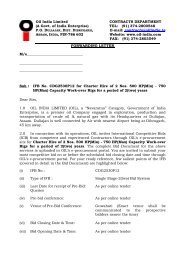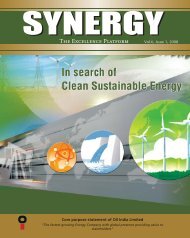2005 - Oil India Limited
2005 - Oil India Limited
2005 - Oil India Limited
You also want an ePaper? Increase the reach of your titles
YUMPU automatically turns print PDFs into web optimized ePapers that Google loves.
OIL beyond territorial barriers<br />
and energy security and to develop an alternate source of<br />
liquid fuel, has taken up an R&D project to study the<br />
techno-economic feasibility of converting the high<br />
sulphur coal of north eastern coalfields into synthetic<br />
crude oil and distilled fuel like LPG, gasoline, kerosene,<br />
diesel etc. Accordingly, a pilot plant was set up in OIL's<br />
headquarters at Duliajan, Assam, in 1999 to generate<br />
scientific data and carry out feasibility studies on direct<br />
coal liquefaction in collaboration with Axens North<br />
America of USA. Though the results of the pilot plant<br />
studies with Axens NA's technologies have been found to<br />
be encouraging, other contemporary technologies are<br />
also being evaluated to select the most appropriate one for<br />
the type of coal available in the North East. OIL, therefore,<br />
is now taking up a preliminary site-specific feasibility<br />
study by adopting the Direct Coal Liquefaction<br />
technology of Hydrocarbon Technologies Inc. (HTI) of<br />
USA. The HTI technology has been adopted by Shenhua<br />
Group of China for its 50,000 bbls / day, pioneer direct<br />
coal liquefaction plant being constructed in China's Inner<br />
Mongolia. The plant is expected to be commissioned in<br />
2007. If it is established that a project on liquefaction of<br />
coal will be commercially viable in <strong>India</strong>, OIL, in<br />
collaboration with competent partners, may set up a<br />
commercial coal liquefaction plant in near future.<br />
International scenario of commercial<br />
coal liquefaction<br />
Use of Coal for producing liquid fuel has been known to<br />
man since the days of First World War. Large commercial<br />
plants were operated in Germany during the Second<br />
World War when a wide range of transportation fuels<br />
were produced from coal to supply the war machines.<br />
South Africa started production of liquid fuels from coal<br />
due to international trade embargo imposed on the<br />
country during apartheid era. Lack of petroleum and<br />
natural gas reserves but abundance of coal reserves also<br />
had driven South Africa towards adopting indirect coal<br />
liquefaction technology to produce liquid fuels and petro<br />
chemicals. Therefore, it can be seen that the commercial<br />
application of liquefaction of coal for production of oil<br />
had taken place in unusual circumstances where price<br />
had been a less critical factor than secured or strategic<br />
supply. With the discovery of cheap crude oil in Middle<br />
East and other places Germany stopped production of<br />
synthetic fuel, but South Africa, under the apartheid rule,<br />
continued production and are still economically<br />
producing syn-fuel from their plants built in 1950s and<br />
1970s as the capital costs of these plants have already<br />
been paid off.<br />
Efforts towards commercial production of liquid fuels<br />
from coal have taken place in the US, UK and Japan<br />
without actual full scale commercial development. The<br />
main reason for not going up to commercial operation in<br />
these countries has been the availability of inexpensive<br />
petroleum supplies in abundance from both domestic and<br />
imported sources. Recent advancements in coal<br />
liquefaction technologies including improved reactor and<br />
catalyst design and their adoption in country like China<br />
are opening up new clean and environment friendly<br />
options for the future.<br />
OIL's efforts for development of coal liquefaction<br />
technologies and capabilities will result in the following<br />
benefits:<br />
Premium quality and environment friendly liquid fuel<br />
will be produced from poor quality coal.<br />
If OIL's project becomes commercially viable <strong>India</strong><br />
will have a new technology in command for<br />
commercial use whenever demand comes.<br />
There will be energy security and insurance for <strong>India</strong><br />
against stoppage of oil supply in the international<br />
market due to war or other situations, decline in the<br />
existing producing oil fields of <strong>India</strong> and due to no<br />
discovery of major oil finds in the coming years.<br />
Coal liquefaction could make a significant contribution<br />
to <strong>India</strong>'s energy supply in the coming decades.<br />
25

















